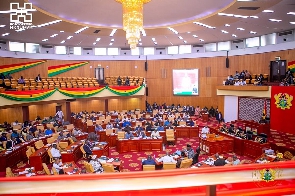Ministers and their deputies as well as Ministers of State are all appointees of the Executive but must by law go through the Legislative arm of government. Relieving such appointees of their posts is usually referred to as the sole prerogative of the appointing authority but the law makes room for the same via Parliament. A vote of censure is an elaborate legislative process through which an appointee of that status can be removed. It hardly succeeds because more often than not, the party in power holds an overwhelming majority in Parliament. But with the current hung Parliament where the only difference between the Majority Group and the Minority is one Member of Parliament, the possibility of removing a Minister via Parliament has come up strongly - and for good reason. The Minister in the eye of the storm is Finance Minister Ken Ofori-Atta, who is currently the subject of a vote of censure application launched by the Minority Caucus in Parliament. But what does the law say about this process: Article 82 of the 1992 Constitution and Order 107 of Parliament's Rules cater for the issue. Article 82 - Vote Of Censure (1) Parliament may, by a resolution supported by the votes of not less than two-thirds of all the members of Parliament, pass a vote of censure on a Minister of State. (2) A motion for the resolution referred to in clause (1) of this article shall not be moved in Parliament unless— (a) seven days' notice has been given of the motion; and (b) the notice for the motion has been signed by not less than one-third of all the members of Parliament; (3) The motion shall be debated in Parliament within fourteen days after the receipt by the Speaker of the notice for the motion. (4) A Minister of State in respect of whom a vote of censure is debated under clause (3) of this article is entitled, during the debate, to be heard in his defence. (5) Where a vote of censure is passed against a Minister under this article the President may, unless the Minister resigns his office, revoke his appointment as a Minister. (6) For the avoidance of doubt this article applies to a Deputy Minister as it applies to a Minister of State. Where the process is currently at Re: Ofori-Atta VoC The Minority in Parliament on October 25 published a prepared motion to censure Ofori-Atta stating seven reasons why the Minister must be removed. Per the signatories on a document sighted by GhanaWeb, the motion has satisfied the threshold of needing at least one-third of MPs to sign onto it. More than 92 MPs signed the motion that was under the name of Minority Chief Whip, Mohammed Mubarak Muntaka. We are at the stage where the Speaker has admitted the motion for a vote of censure, hence it is thus properly before the House for subsequent action. If it does get to that stage, then the Minority bloc of 136 MPs (minus Assin North MP) will need the support of some Majority Group MPs to remove the Minister. The Minority will need only 47 MPs from the other side to vote with them to successfully execute the removal. The voting process is secret balloting. Note must be taken, however, of the power, the president can exercise in the event that the vote is successful. "Where a vote of censure is passed against a Minister under this article the President may, unless the Minister resigns his office, revoke his appointment as a Minister," the law states. Will the 80-plus MPs calling for the head of Ofori-Atta side with the Minority to undertake what will be a historic event in Ghana's political and parliamentary space, time, as they say, will tell. SARA/PEN
General News of Friday, 28 October 2022
Source: www.ghanaweb.com













